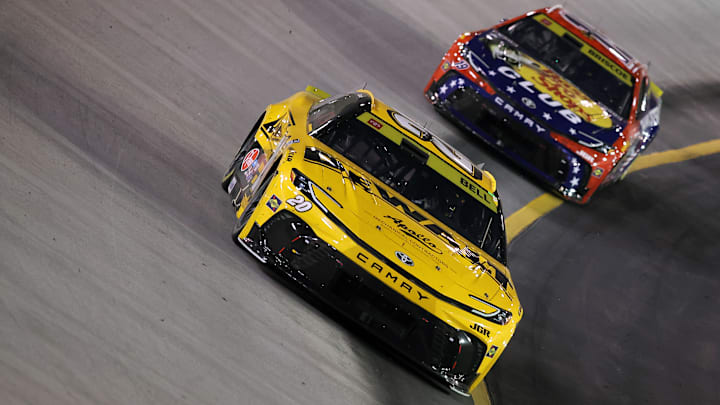We've heard about pretty much every flaw there is with the modern NASCAR playoff format over the past couple seasons, to the point where, after 12 years of the knockout setup, NASCAR is likely to make some sort of change heading into 2026.
Whether it's the "win and in" nature of the format, the fact that season-long performance and consistency mean next to nothing compared to getting hot at the right time, or the fact that your entire season can become undone by a questionable caution and subsequent overtime shootout in a season finale you've dominated, fans have had enough.
Let's go a step further: NASCAR's best performing playoff driver wasn't even one of the four Championship 4 drivers.
Not best regular season performer. Not best average finisher. Best playoff driver.
How did this happen?
Without giving the blanket answer of "the playoff format is flawed", something that becomes more and more apparent by the day, let's take a look at how Joe Gibbs Racing's Christopher Bell, who led all drivers 343 points scored during the first nine races of the playoffs, somehow failed to advance to the Championship 4.
Bell, who actually did lead the series this year (by a wide margin) in total points scored if you remove stage racing from the equation, scored 23 playoff points during the regular season: 15 from his three race wins, two from his two stage wins, and six from his fifth place finish in the regular season standings. He added five more with a win in the round of 16 race at Bristol Motor Speedway.
Bell advanced to the round of 8, but he started four points below the Championship 4 cut line, since his 28 playoff points were fifth-most among remaining drivers.
Joe Gibbs Racing teammates Denny Hamlin and Chase Briscoe, as well as Hendrick Motorsports' William Byron, each won a race during the round of 8, meaning that in order to get to the Championship 4, Bell needed to finish the round tops among the five remaining drivers in points. He finished second behind Hendrick Motorsports' Kyle Larson.
Bell started the round of 8 sitting four points behind Larson, and Larson outscored him by three points (123 to 120) during the round. Bell outscored Hamlin, Briscoe, and Byron during the round of 8, and he actually passed all three in points with his performance; he jumped from fifth to second in points, seven points behind Larson.
But it wasn't enough.
His worst finish of the round of 8 was eighth place, best among championship contenders. His average finish in the round of was sixth, again best among championship contenders.
But it wasn't enough, and so the driver who scored more points than anybody else through the first nine races of the playoffs wasn't good enough to be one of the four playoff drivers in championship contention.
Was the format really ever about "being your best when the lights shine brightest"?
In the first nine playoff races, Larson was second in points with 340. Briscoe was third with 337. Byron was fifth with 288, and Hamlin was eighth with 270.
Bell's 343, most among all 36 full-time drivers, weren't enough to place ahead him any one of those four in the only metric that supposedly "mattered".
If there was ever time for a change, something to bring back some kind of balance between "best driver", "most deserving driver", and "actual champion", that time is now.
